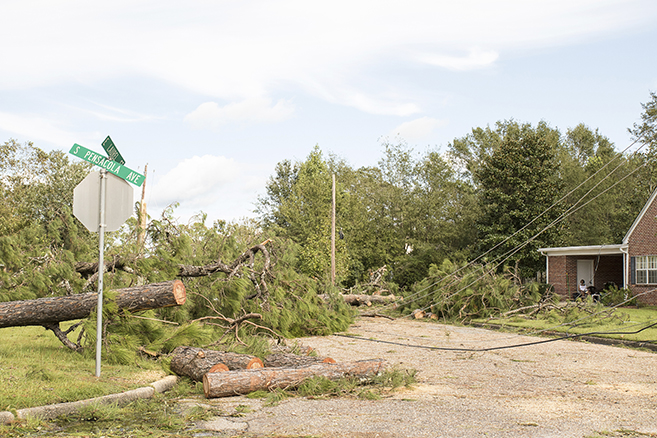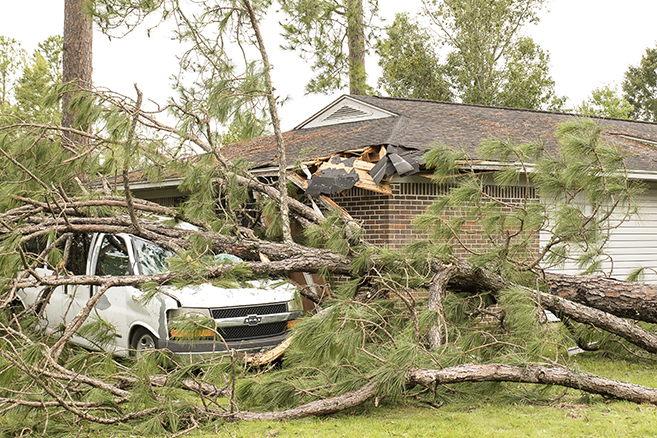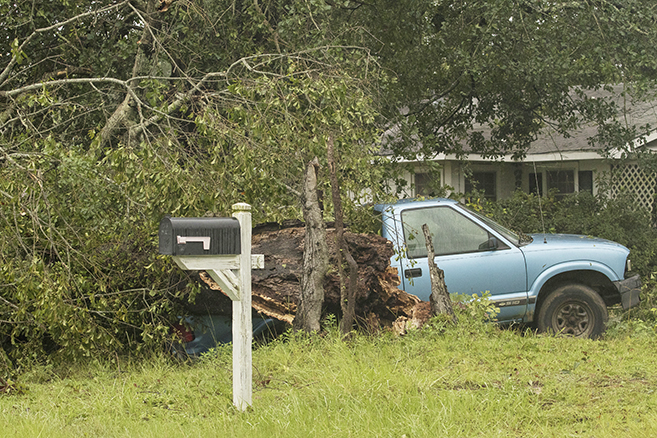Toppled trees, flooding plague city, area

By DON FLETCHER
News Staff Writer
For the past three years, Atmore and the immediate area have escaped the wrath of major storms that have wreaked havoc on neighboring counties. Not this time.
When Hurricane Sally stormed out of the Gulf of Mexico at Gulf Shores last Wednesday (September 16), it raged inward through Mobile, Baldwin and Escambia counties. The brunt of the weather phenomena struck Atmore with the force of a freight train, toppling hundreds of trees onto houses, vehicles and roadways.
Miraculously, no deaths — not even any serious injuries — were reported here, although structural damage abounded as strong winds buffeted the area and torrential rains overwhelmed drainage systems and helped uproot giant trees that had withstood the gale force winds.
“We got it this time, a double dose of it,” said Atmore Fire Chief Ron Peebles of the hurricane, which packed sustained winds of 35 miles per hour as it passed through the city.
Teamwork
Luckily, emergency services personnel throughout the city were prepared when the devastating tempest roared into town.
“The police department, the street department and the fire department all gave it their all,” he said. “Not the first one slacked up. Every one of the guys, and I mean everybody, at all three departments just went to work.
“(Police) Chief (Chuck) Brooks had a chain saw in his hands; (Streets and Sanitation Director) Calvin (Grace) had a chain saw in his hands, and I had a chainsaw in my hands. Every department performed the way they were supposed to. We all worked together probably better than we ever have.”
The fire chief said he isn’t sure exactly how many trees were felled by the storm, but he said it was a large number. AFD personnel responded to 46 downed tree calls in the nine-hour period between 1 p.m. and 10 p.m. Wednesday, and that Brooks estimated the total number of toppled trees was more than three times that number.
“We assisted the fire department and the street department with cutting up trees and removing the debris from the streets and roads,” the police chief said. “I would say that we had somewhere around 150 trees we were able to remove from the roadways. There were a lot of others that had power lines in them. We have to treat those as live wires until the power company gets here. That’s why we couldn’t move a lot of those trees.”
Grace, whose crews provided five dump truck loads of sand with which the public could fill sandbags, agreed that all three agencies performed well together.
“The fire department and police department were helping us; we were all working and communicating as a team,” he said.
Grace said his department’s response was enhanced by the inclusion of several employees who were on hand when Hurricane Ivan ransacked the city on 2004.
“We have about five or six guys who were here during Ivan, so they knew what had to be done,” he said. “We had some newcomers that this was their first time encountering a hurricane. I took the guys who had been here through Ivan and put them in charge.”
Minor infrastructure damage
While Hurricane Sally tore neighborhoods apart, it left most municipal and related properties and structures intact.
Mayor Jim Staff said numerous trees fell within city parks, but there was no damage to the infrastructure, although there was one close call.
“We had generators running for all essential services,” the mayor said. “Our sewer plant did lose one generator, but we hooked another one to it and kept it going. Can you imagine what that would have been like if we hadn’t been able to do that?”
Kenny Smith, general manager of West Escambia Utilities, said WEU sustained damage to one water line, but the fact that the lines are pressurized kept any contaminants from reaching the water supply. While crews were trying to repair the water-line breach, a gas line began leaking when a tree fell, yanking the line with it as its roots pulled from the ground.
He also noted that a “top hat,” which is an access to the interior of a water tank, was blown off, forcing the utility company to shut that tank down.
“Fortunately, we have enough tanks that we could operate on probably two of them, if we had to,” Smith said, adding that no gas customers lost service and no boiled-water notices had to be issued.
No preferential response
Although some residents claimed that emergency personnel favored the southern portion of town over the northern, each of the three department heads said that wasn’t the case at all.
Peebles said he sent four crews to the city’s northern sector and two to the southern sector because “there were literally more trees down in the northern part of town than there were in the southern part,” while Brooks and Grace said police officers and streets-sanitation workers were split equally between the two.
Each also said Atmore Community Hospital was a priority area that had to be dealt with first, and many other essential business entities were either below or along Nashville Avenue.
“One of the power company guys said the first thing they try to do is go to the hospital and try to get it going,” Grace said. “Then they tried to get the grocery stores and service stations so people can come and go. Most of those places are on the south side of town, and I think that’s why a lot of people got concerned.
“Some (residences in the southern sector) got power before the others because they were on the same power grid (as the hospital, service stations, etc.). This is what you need to survive. I heard a lot of people say that the south side got priority, but it wasn’t about that; it wasn’t about that at all. Look at Pensacola Avenue; they didn’t get power until Saturday.”
Brooks and Peebles agreed.
“Our protocol is to make sure we get the roads to the hospital clear, then get as much of the other streets as clear as we can,” the police chief said.
Peebles said AFD’s first priorities were to make sure the hospital had power, that people could get to the hospital if they needed to, and that the main thoroughfares into town (Alabama 21 and U.S. 31) were open so any assistance could reach the areas of devastation.
“We did not choose anywhere,” he said. “We started with the closest and went out. We did not show preference to anybody.”
Next, the cleanup
Grace said the cleanup from Sally’s violent tirade would take at least a couple of months, but at least “everybody should be able to leave home and go where they need or want to go.”
Staff said he was glad to see that the damage wasn’t nearly as bad as it could have been.
“We were blessed,” he said. “It could have been a lot worse than it was.”


